As a dedicated holistic veterinarian, I’ve always believed in the power of knowledge when it comes to our beloved pets’ health. It’s no different when we’re talking about Black Russian Terrier Eye Health. This magnificent breed, known for its intelligence and loyalty, can unfortunately be prone to certain eye conditions. But don’t worry, armed with the right information, you can take steps to ensure your furry friend’s eyes stay as bright and healthy as possible.
Understanding the unique eye structure of Black Russian Terriers is key to recognizing potential issues early. From there, we’ll explore the common eye diseases that can affect this breed, such as cataracts and progressive retinal atrophy. But it’s not all doom and gloom – I’ll also share preventive measures you can take, like providing a holistic diet rich in natural Vitamin A and antioxidants, and considering whole-food-based nutritional supplements.
Environmental hygiene also plays a crucial role in Black Russian Terrier Eye Health. I’ll share tips on maintaining indoor air quality and being mindful of potentially irritating substances like sprays, diffusers, candles, and incense. And of course, we’ll discuss routine eye care and maintenance to keep those beautiful eyes in top shape. So, let’s embark on this journey together to ensure your Black Russian Terrier’s eyes remain healthy and vibrant!
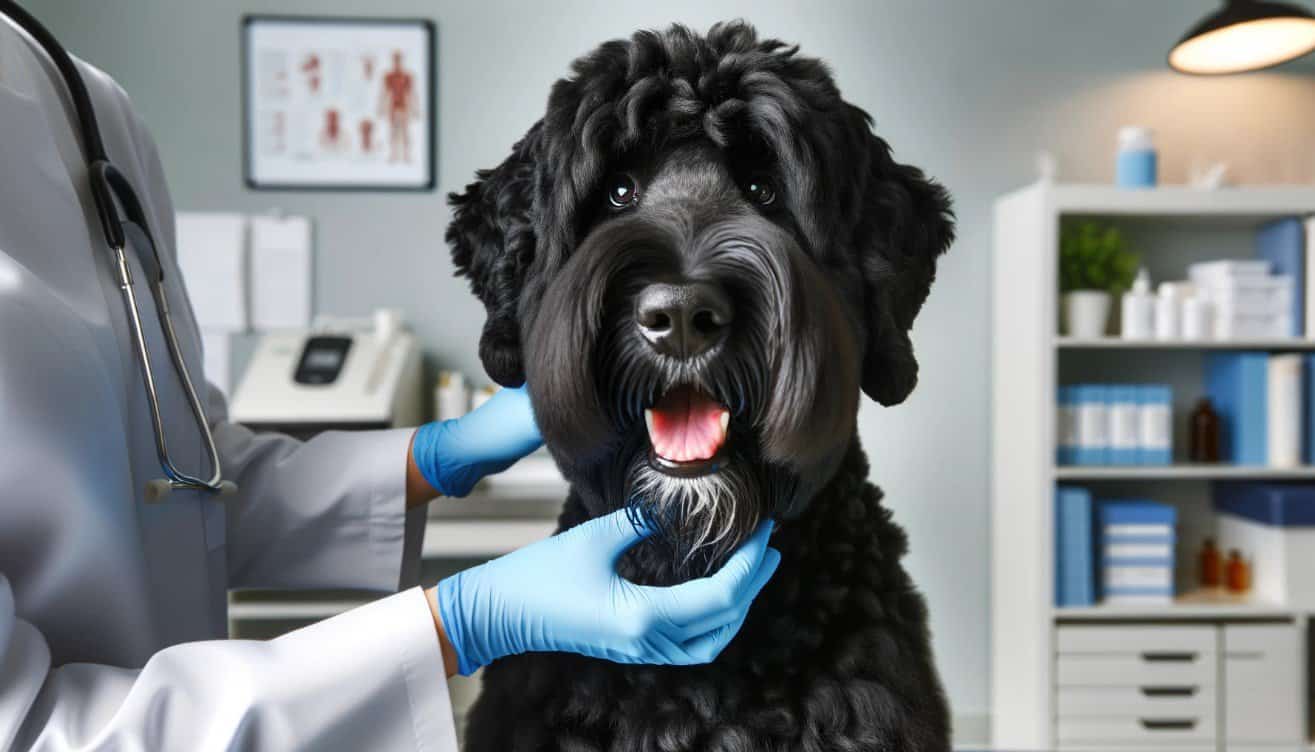
Understanding Breed Specific Eye Structure
Imagine being able to spot potential eye problems in your Black Russian Terrier even before they become serious. Understanding the unique eye structure of this breed is the key to that. It equips you to better care for your furry friend, ensuring they maintain optimal eye health throughout their life.
The Black Russian Terrier, a beautiful and robust breed, has a distinctly unique eye structure. They possess medium-sized, oval-shaped eyes that are set well apart. Their eyes are typically dark, enhancing their expressive and intelligent gaze. The Black Russian Terrier’s eyelids are tight, which helps to protect their eyes from dirt and debris.
An interesting fact about the breed’s eye structure is the presence of a third eyelid, also known as the nictitating membrane. This additional eyelid serves as an extra layer of protection, shielding the eye from potential irritants and helping to keep it moist.
While these anatomical features generally contribute to the Black Russian Terrier’s good eye health, they can unfortunately also predispose them to certain eye conditions. For instance, their tight eyelids can sometimes turn inwards, a condition known as entropion, causing discomfort and potential damage to the eye. Similarly, their third eyelid can become inflamed or infected, leading to a condition known as cherry eye.
Understanding these unique eye structure characteristics is crucial in proactively managing your Black Russian Terrier’s eye health. By knowing what is normal for your pet, you can more easily spot any abnormalities or signs of potential problems. It’s like having a roadmap to your pet’s eye health, guiding you in keeping their eyes bright, clear, and healthy.
Remember, the eyes are the windows to your pet’s health. Regularly monitoring your Black Russian Terrier’s eyes and understanding their unique eye structure can go a long way in ensuring their overall well-being. So, keep an eye out for any changes, and don’t hesitate to seek veterinary advice if you notice anything unusual. After all, when it comes to your pet’s health, it’s always better to be safe than sorry.
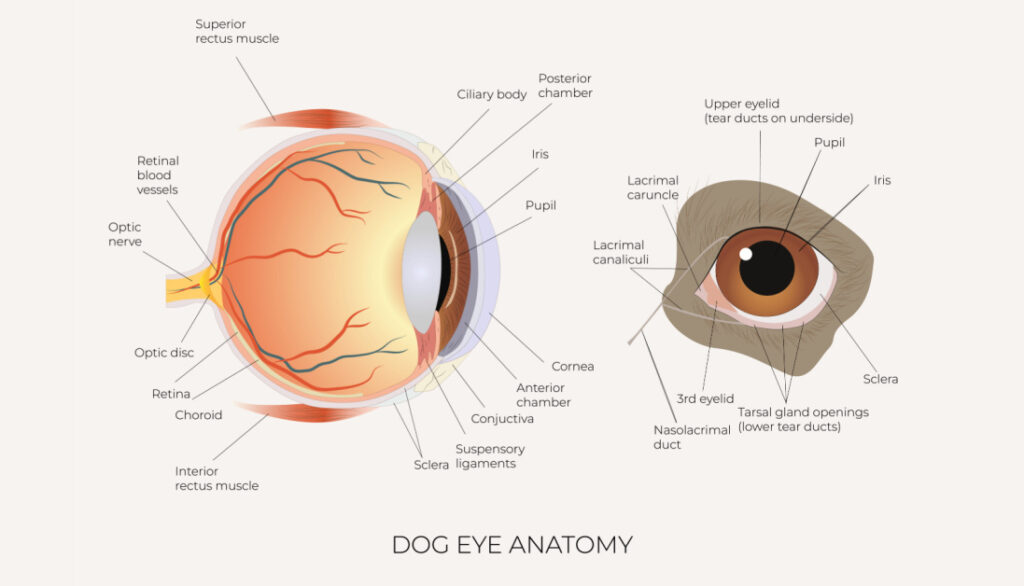
Common Eye Issues In Black Russian Terrier
As a veterinarian, I’ve cared for many Black Russian Terriers and have noticed that this breed sometimes suffers from specific eye health issues. It’s important to be aware of these potential problems to ensure your dog’s eyes remain healthy and clear.
One of the most common eye problems in Black Russian Terriers is Progressive Retinal Atrophy (PRA). This is a degenerative eye disorder that eventually leads to blindness. Symptoms usually start with night blindness and progress to total blindness over time.
Another common issue is Entropion, a condition where the eyelid rolls inward, causing the eyelashes to rub against the cornea. This can cause irritation, redness, and even corneal ulcers if not treated promptly.
Cataracts are also quite common in Black Russian Terriers. These cloudy formations on the lens of the eye can lead to impaired vision and potentially blindness if left untreated. However, with early detection and proper care, cataracts can often be treated successfully.
Lastly, Black Russian Terriers may also suffer from Cherry Eye. This occurs when the gland in the third eyelid protrudes, giving the appearance of a red mass in the corner of the eye. While not usually painful, it can cause discomfort and needs to be addressed by a vet.
Here’s a quick overview of these common Black Russian Terrier eye health issues:
| Condition | Symptoms | Treatment |
|---|---|---|
| Progressive Retinal Atrophy (PRA) | Night blindness, over time leading to total blindness | No cure, but antioxidant supplements may slow progression |
| Entropion | Irritation, redness, potential corneal ulcers | Surgical correction |
| Cataracts | Cloudy formations on the lens, impaired vision | Surgery, if severe |
| Cherry Eye | Red mass in the corner of the eye | Surgical correction or medication |
Remember, early detection is key in managing these conditions. Regular vet check-ups and being observant of your dog’s behavior can go a long way in maintaining your Black Russian Terrier’s eye health. If you notice any changes in your dog’s eyes, such as cloudiness, redness, or your dog squinting, it’s important to seek veterinary care immediately.
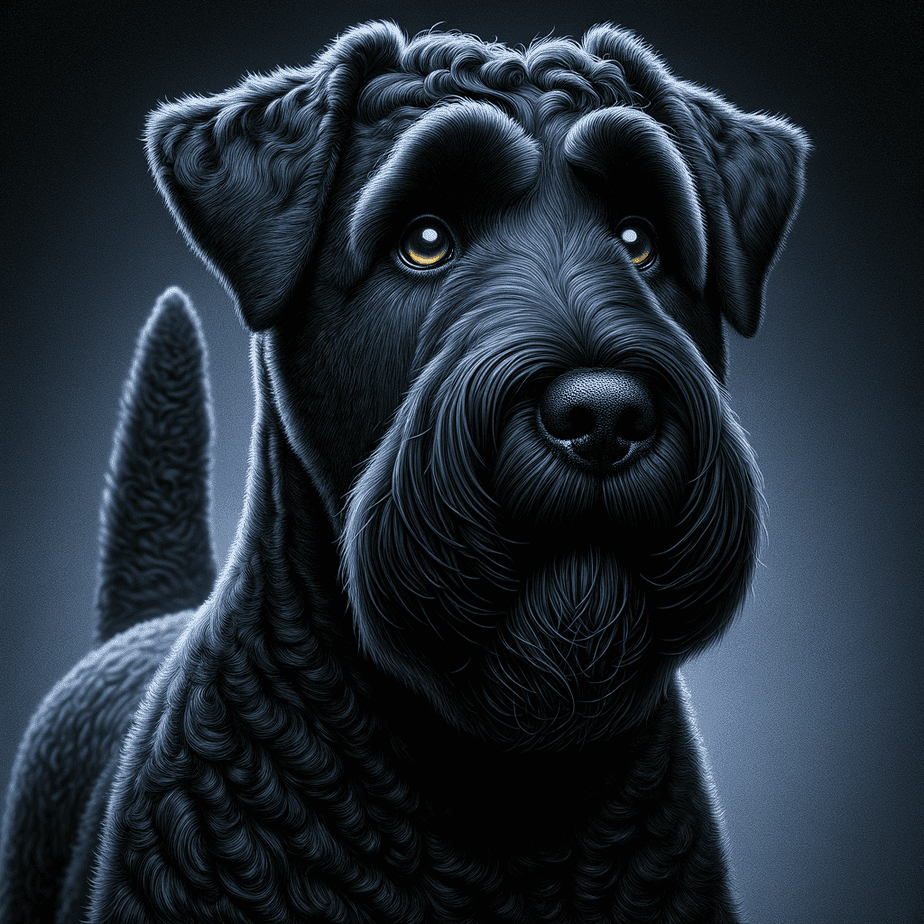
Prevention of Eye Problems in Black Russian Terriers
Ensuring your Black Russian Terrier gets the right nutrients for optimal eye health is essential for maintaining clear vision and preventing age-related issues. Natural, nutrient-rich foods and supplements can play a key role in supporting their eyesight. From vitamin A-packed freeze-dried liver treats to antioxidant-rich blueberries and targeted supplements like Eyeplex by Standard Process, there are several ways to nourish your dog’s eyes. In this section, we’ll explore how these powerful ingredients contribute to long-term vision health and overall well-being.
Eyeplex by Standard Process
Eyeplex by Standard Process is a specialized supplement designed to support your Black Russian Terrier’s eye health with a blend of essential nutrients. Formulated with key vitamins, minerals, and antioxidants, Eyeplex helps protect against oxidative stress, supports retinal function, and promotes overall vision health. Ingredients like vitamin A, vitamin C, and zinc contribute to maintaining strong eyesight, while whole food ingredients provide additional phytonutrients for cellular protection. Adding Eyeplex to your Black Russian Terrier’s diet can be especially beneficial for aging dogs or breeds prone to eye conditions, offering targeted nutritional support to keep their vision sharp and healthy for years to come.
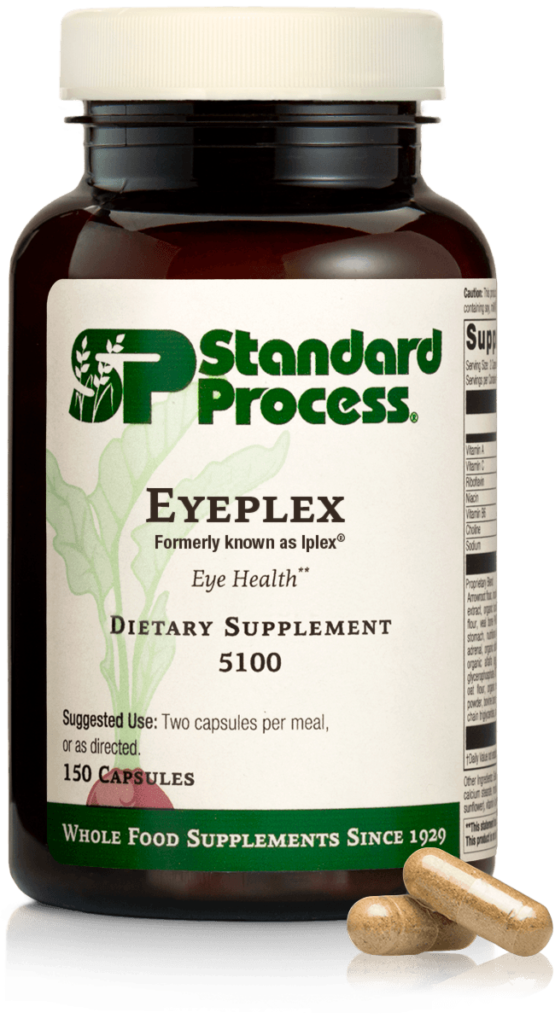
Freeze-Dried Blueberries
Freeze-dried blueberries are a powerhouse of antioxidants that can help protect your Black Russian Terrier’s eyes from oxidative stress and age-related damage. Rich in vitamins C and E, as well as anthocyanins, these tiny but mighty berries help combat free radicals that can contribute to eye diseases like cataracts and macular degeneration. Incorporating freeze-dried blueberries into your dog’s diet provides a natural and delicious way to support retinal health, reduce inflammation, and promote overall vision longevity. Plus, they’re a low-calorie, dog-friendly treat that makes a great addition to a balanced diet for long-term eye health.
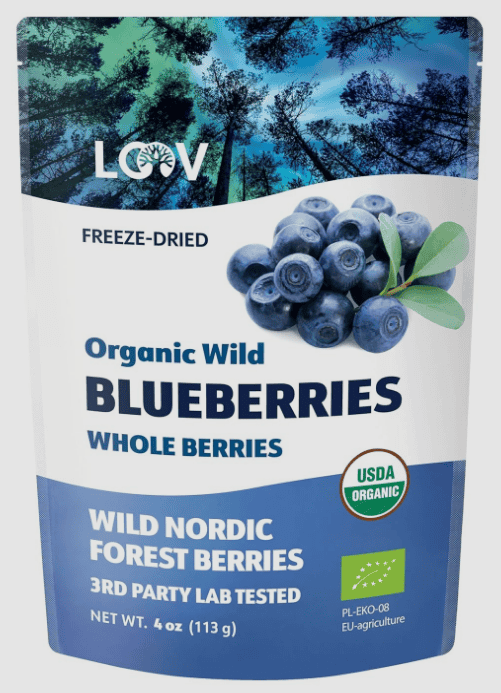
Freeze-Dried Liver
Freeze-dried liver treats are an excellent natural source of vitamin A, an essential nutrient for your Black Russian Terrier’s eye health. Vitamin A plays a crucial role in maintaining good vision, especially in low-light conditions, while also supporting overall immune function and skin health. Since liver is rich in bioavailable vitamin A, incorporating freeze-dried liver treats into your dog’s diet provides a convenient and nutritious way to promote optimal eye function. Just be sure to feed them in moderation, as excessive vitamin A can lead to toxicity. Adding these nutrient-packed treats to your pup’s routine is a simple, tasty way to support their long-term vision and well-being!

By prioritizing your Black Russian Terrier’s eye health through a balanced diet and nutritional supplements, you can help prevent many common eye issues. These simple steps can go a long way in ensuring your pup’s eyes stay healthy and clear for years to come.
Remember, before starting any new supplement regimen for your pet, always consult with your vet to ensure it’s suitable for your Black Russian Terrier’s specific needs.
Environmental Hygiene To Reduce Eye Problems
As an owner of a Black Russian Terrier, you must be aware that environmental factors can significantly affect your dog’s eye health. To maintain your Black Russian Terrier’s eye health, you need to pay attention to the environment in which your dog lives. Let’s discuss some environmental hygiene tips that can help reduce eye problems in your Black Russian Terrier.
Indoor Air Quality
Indoor air quality plays a crucial role in your Black Russian Terrier’s eye health. Poor air quality, laden with dust, dander, and other airborne irritants, can lead to eye irritations and infections. To maintain good indoor air quality, ensure proper ventilation in your home. Regularly clean your home to minimize dust and dander. If possible, invest in an air purifier to further improve air quality. Also, avoid smoking indoors as it can irritate your dog’s eyes.
Sprays, Diffusers, Candles, Incense
While sprays, diffusers, candles, and incense can make your home smell good, they can potentially harm your Black Russian Terrier’s eyes. The chemicals in these products can cause eye irritation and even lead to more serious eye problems. If you must use these products, do so sparingly and in a well-ventilated area. Make sure your dog is not in the room when you are using these products. Also, always keep these items out of your dog’s reach to prevent accidental ingestion or contact with the eyes.
Remember, maintaining a clean and healthy environment is a crucial part of Black Russian Terrier Eye Health management. By taking these simple steps, you can significantly reduce the risk of eye problems in your Black Russian Terrier. Always observe your dog for any signs of eye discomfort and consult a vet if you notice any changes in your dog’s eyes.
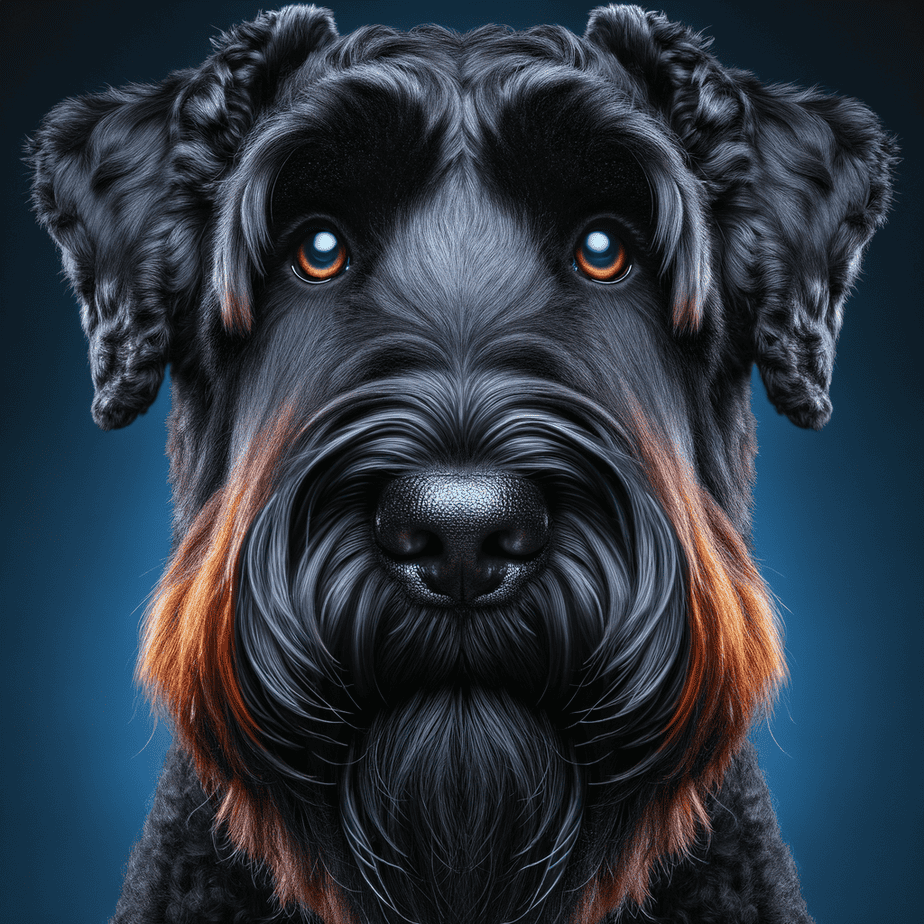
Routine Black Russian Terrier Eye Care & Maintenance
As a dog parent, ensuring your Black Russian Terrier’s eye health is a top priority. Here are some essential tips for daily and weekly maintenance, as well as guidelines on monitoring hair and nail length and bath frequency to keep your furry friend’s eyes healthy.
Daily & Weekly Care & Maintenance
Regular eye care for Black Russian Terriers is crucial to prevent common eye problems. Here are some steps you can incorporate into your daily and weekly routines:
- Inspect your dog’s eyes daily. Look out for any signs of redness, cloudiness, or excessive tearing. If you notice any changes, consult your vet immediately.
- Keep the hair around your dog’s eyes trimmed. Overgrown hair can irritate the eyes, leading to Black Russian Terrier eye infections.
- Use a clean, damp cloth to gently wipe away any discharge from the corners of your dog’s eyes. Avoid using soap or shampoo near the eyes, as these can cause irritation.
- Use a dog-specific eye solution, as recommended by your vet, for regular eye cleaning. Human eye drops or solutions could cause harm.
Monitoring Hair Length, Nail Length, and Bath Frequency
Aside from regular eye care, other aspects of your Black Russian Terrier’s grooming can also impact their eye health. Here are some factors to consider:
- Hair length: The Black Russian Terrier’s coat needs to be trimmed regularly, particularly around the eyes. Long hair can poke and scratch the eyes, leading to irritation or injury.
- Nail length: Long nails can scratch the eye if your dog rubs their face with their paws. Regular nail trims can help prevent this risk.
- Bath frequency: Bathing your dog too often can dry out their skin and coat, which can cause dandruff. This could lead to eye irritation if it gets into their eyes. Stick to a bath routine recommended by your vet.
Remember, your Black Russian Terrier’s eye health is a reflection of their overall health and well-being. Regular check-ups with your vet, a balanced diet, a clean environment, and a proper grooming routine will go a long way in maintaining your dog’s eye health. Always consult your vet if you notice any changes in your dog’s eyes. After all, early detection and treatment of Black Russian Terrier eye diseases can prevent further complications and ensure your furry buddy enjoys a happy and healthy life.
Frequently Asked Questions
1. What are common eye health conditions in Black Russian Terriers?
Black Russian Terriers may be prone to several eye health conditions, including cataracts, progressive retinal atrophy (PRA), and entropion.
2. How can I identify if my Black Russian Terrier has an eye health problem?
Watch out for symptoms such as redness, excessive tearing, cloudiness, squinting, or any changes in your dog’s vision. If you notice any of these signs, it is recommended to consult a veterinarian for a thorough examination.
3. Can eye health conditions in Black Russian Terriers be treated?
Yes, many eye health conditions in Black Russian Terriers can be treated. The treatment options vary depending on the specific condition and its severity. It is crucial to consult a veterinarian for an accurate diagnosis and appropriate treatment plan.
4. How can I prevent eye health problems in my Black Russian Terrier?
While some eye health conditions may be hereditary, there are steps you can take to minimize the risk. Regular veterinary check-ups, proper nutrition, and avoiding exposure to irritants or trauma can help maintain good eye health in your Black Russian Terrier.
5. Should I seek veterinary advice for any eye-related concerns in my Black Russian Terrier?
Yes, it is always recommended to seek veterinary advice if you have any concerns about your Black Russian Terrier’s eye health. A professional evaluation can help identify any underlying issues and provide appropriate guidance or treatment.
